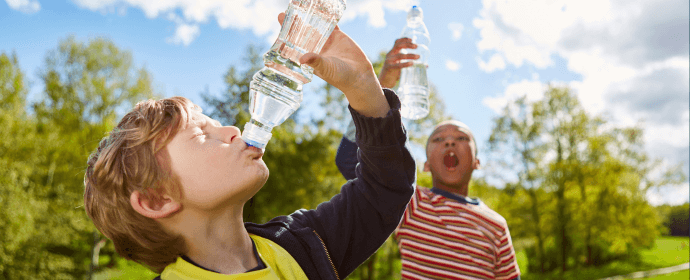Our general health and well-being depend on drinking enough water. However, a common question often arises: “how many water bottles should I drink in a day?” Within this in-depth guide, we’ll explore the various aspects that affect our daily water intake and offer helpful advice to help you meet your drinking requirements.
Understanding Daily Water Requirements
Our bodies rely on water for essential physiological processes, such as maintaining a stable temperature, facilitating digestion, and transporting vital nutrients. Various factors, including age, gender, activity level, climate, and overall health, can affect our daily water requirements.
Although the “8×8” rule is often cited as a general recommendation, it’s important to note that everyone’s water needs can differ.
These are some important factors that affect your daily water requirements:
- Body Weight: Consuming about half of your body weight in ounces of water daily is recommended. As an expert in hydration, a person weighing 150 pounds would require approximately 75 ounces of water.
- Activity Level: Physical activity increases the amount of water lost through sweat. Individuals who engage in physical activity or lead active lives may have higher water needs.
- Climate and Temperature: In hot and humid environments, sweat accelerates evaporation. Make sure to adjust your intake accordingly.
- Diet: When it comes to your diet, it’s worth considering the high water content in fruits and vegetables such as watermelon and cucumber. These can be a great addition to your daily intake. However, diuretics such as coffee can lead to increased urination and a mild decrease in hydration levels.
- Overall Health: Underlying health conditions and medications can impact water requirements. It is always important to seek personalized advice from your doctor.
Signs of Dehydration 
Knowing the indicators of dehydration is vital. These include feelings of thirst, urine that is darker in color, fatigue, dizziness, and a dry mouth. Neglecting these symptoms may result in a loss of physical and cognitive abilities and possible health issues.
Having a good grasp of these signs will help you act on dehydration and avoid potential health problems.
- Thirst: The body’s natural signal that it needs more fluids. It’s crucial to understand that depending solely on thirst to gauge dehydration may only sometimes be enough, particularly during physical exertion or in hot conditions.
- Dark Urine: The color of urine can offer important clues about your hydration level. Properly hydrated individuals usually have urine that is light yellow or clear.
- Fatigue and Dizziness: Dehydration, which can result in increased waste concentration and decreased water content, causes the darkening of urine.
Feeling dizzy or lightheaded can sometimes happen, particularly when getting up quickly or engaging in physical activity.
- Dry Mouth: Reduced saliva production can lead to a parched, adhesive sensation in the mouth.
Having a parched mouth is a common side effect of being thirsty, and it can lead to feelings of discomfort and unpleasant breath.
Disregarding these indicators of dehydration can lead to severe repercussions for one’s health and overall well-being. This includes the risk of heat-related ailments, urinary tract problems, and diminished physical and cognitive abilities.
To effectively combat dehydration and its related symptoms:
- Stay hydrated by drinking water regularly, even if you don’t feel thirsty.
- Ensure you include plenty of hydrating foods and beverages, such as fruits, vegetables, and herbal teas.
- Be mindful of your body’s cues for staying hydrated, and quench your thirst promptly.
- Monitor urine color to gauge hydration levels and make necessary adjustments to water consumption.
- Remember to take breaks and find shaded areas during hot weather to avoid losing too much fluid through sweating.
- Suppose you notice any indications of dehydration, such as feeling thirsty, having dark urine, experiencing fatigue, dizziness, or having a dry mouth. In that case, it’s important to hydrate yourself and promptly consider seeking medical advice.
By being attentive and proactive about staying hydrated, you can ensure your health and well-being are at their best.
Benefits of Proper Hydration 
Recognizing the importance of staying properly hydrated is essential for maintaining good health. It has been proven that staying hydrated can positively impact cognitive function, physical performance, mood, digestion, and metabolism. Providing proper hydration is essential for improving your overall well-being and productivity.
- Improved Cognitive Function: The brain relies heavily on proper hydration, and even a slight lack of water can hinder cognitive abilities, leading to difficulties in concentration, clarity of thought, and decision-making. Research has indicated that maintaining proper hydration levels can positively impact cognitive abilities, such as memory, attention, and mood regulation. Ensuring adequate hydration for your brain can enhance mental sharpness and sustained focus throughout the day.
- Improved Physical Performance: Proper hydration is essential for maintaining optimal body temperature and promoting the smooth functioning of joints, muscles, and tissues. Proper hydration is crucial during physical activity as it ensures a steady blood flow to your muscles, prevents overheating and boosts your endurance and performance. Whether you’re an athlete or just going about your daily routine, staying adequately hydrated can improve your physical performance and help prevent fatigue and muscle cramps.
- Enhanced Mood: Dehydration can contribute to changes in mood, including feelings of irritability, anxiety, and fatigue. On the other hand, ensuring adequate hydration can contribute to stabilizing mood and fostering a sense of well-being and positivity. Ensuring adequate hydration throughout the day can positively impact neurotransmitter function and hormone balance, which can contribute to a more balanced and uplifted mood.
- Support for Digestion and Metabolism: Proper hydration is crucial for optimal digestion and metabolism. Water plays a vital role in breaking down and absorbing nutrients, facilitating the smooth movement of food through the digestive tract, and effectively eliminating waste products and toxins from the body. Proper hydration can help prevent constipation, maintain regularity, and support a healthy metabolism, improving digestive health and weight management.
By emphasizing the importance of staying hydrated and consuming adequate water daily, you can experience a wide range of health advantages and enhance your overall physical and mental performance. No matter where you are – the office, the gym, or your own home – it’s important to always have a water bottle within reach and to hydrate consistently throughout the day.
Tips for Meeting Your Water Intake Goals 
For optimal hydration, always having a reusable water bottle handy is a good idea. Set reminders to stay hydrated, especially when you’re active or in hot weather. Make sure to include plenty of hydrating foods like fruits and vegetables in your diet while being mindful of your intake of dehydrating beverages such as alcohol and caffeinated drinks.
Luckily, there are numerous practical tips and strategies you can use to make sure you stay properly hydrated:
- Investing in a reusable water bottle is a simple and efficient method to enhance your water consumption. Select a water bottle that you find pleasing and bring it anywhere. Knowledge of water allows easy access to hydration and enables you to monitor your intake.
- Amidst the chaos of our busy lives, it’s often overlooked to stay hydrated. Set reminders on your phone or utilize a water-tracking app to help you stay on top of your hydration game. You can set up reminders at various points throughout the day or at specific times when it’s easy to overlook things, like during meetings or when you’re out running errands.
- Stay hydrated by drinking water regularly, even before you feel thirsty. Thirst is a clear indication that your body is starting to become dehydrated. Drinking water before you start feeling thirsty is important for staying hydrated. It’s essential to develop a routine of drinking water throughout the day, rather than waiting until you feel extremely thirsty. By staying proactive about your hydration, you can ensure optimal water levels throughout your body.
- Besides drinking water, you can boost your fluid intake by incorporating hydrating foods like fruits and vegetables. Many fruits and vegetables are known for their high water content, making them a great way to stay hydrated. Include cucumbers, watermelon, strawberries, oranges, and celery in your diet to increase your water intake naturally.
Limiting your intake of dehydrating drinks such as alcohol and caffeinated beverages can help prevent fluid loss and dehydration. If you enjoy these beverages, it’s essential to make sure you also drink plenty of water to maintain a healthy balance.
Dispelling Common Myths and Misconceptions
Contrary to popular opinion, sometimes consuming glasses of water daily is only sometimes necessary. Paying attention to your body and adapting your water intake based on your individual needs is crucial. In addition, caffeinated beverages such as coffee and tea can contribute to your overall fluid intake and don’t necessarily cause dehydration.
Choosing the Right Water Bottle 
Investing in a reusable water bottle is a smart choice for those who care about the environment and want a practical solution for staying hydrated while on the move. Consider factors like size, material, and design when choosing a water bottle that fits your needs and preferences. Choose bottles that are free of BPA, can be safely washed in the dishwasher, and are simple to clean and care for.
Frequently Asked Questions(FAQ’s)
Is 4 Bottles of Water a Day Enough?
It varies based on weight, activity level, and climate. Pay close attention to thirst cues and signs of dehydration to make necessary adjustments to fluid intake.
Should I Drink 1 Bottle of Water a Day?
For many individuals, more than a single bottle of water may be required. Consuming at least 8 glasses (2 liters) of water daily is recommended, taking into account individual requirements.
How Many Bottles of Water Should I Drink a Day for My Weight?
Determine your daily water intake based on weight, and consume approximately half an ounce to an ounce for every pound. Take into account your activity level, the climate you’re in, and your current health status.
Is 5 Liters of Water a Day Too Much?
Proper hydration is essential, but it’s important to be mindful of excessive water consumption. For example, consuming 5 liters of water daily can result in overhydration and potential health problems such as hyponatremia. Consume water in appropriate amounts.
Does Coffee Count as Water Intake?
Although coffee can contribute to your fluid intake, it’s important to note that it has diuretic properties. Consuming excessive amounts of caffeine can lead to dehydration. Ensure proper hydration by balancing your coffee intake with water.
In summary
Ensuring adequate hydration is crucial for sustaining peak health and vitality. By deeply understanding your unique water requirements and implementing effective methods to fulfill them, you can guarantee optimal hydration all day. Pay attention to your body’s needs, prioritize staying hydrated, and enjoy the numerous advantages of consuming adequate water daily.





Leave a Reply